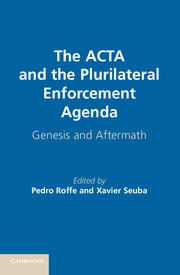Book contents
- Frontmatter
- Contents
- List of Contributors
- Foreword
- Acknowledgments
- Acronyms
- Introduction
- PART I THE FINAL ACT: ITS MAIN FEATURES AND CONTENTS
- 1 An Overview of the Agreement
- 2 ACTA Initial Provisions and General Definitions
- 3 ACTA General Obligations with Respect to Enforcement
- 4 Provisions on Civil Enforcement – Section 2 of ACTA
- 5 Legal Framework for Enforcement
- 6 ACTA and Beyond
- 7 ACTA’s Digital Chapter
- 8 The ACTA Committee
- PART II DOMESTIC LEGISLATIVE CHALLENGES
- PART III IMPACT ON RELATED PROCESSES
- PART IV VIEWS FROM STAKEHOLDERS: LESSONS
- PART V WHAT LIES AHEAD ACTA
- Annex I Anti-Counterfeiting Trade Agreement
- References
- Index
- References
6 - ACTA and Beyond
Towards a Differentiated Approach to Criminal Enforcement of Intellectual Property Rights at the Global Level
Published online by Cambridge University Press: 05 December 2014
- Frontmatter
- Contents
- List of Contributors
- Foreword
- Acknowledgments
- Acronyms
- Introduction
- PART I THE FINAL ACT: ITS MAIN FEATURES AND CONTENTS
- 1 An Overview of the Agreement
- 2 ACTA Initial Provisions and General Definitions
- 3 ACTA General Obligations with Respect to Enforcement
- 4 Provisions on Civil Enforcement – Section 2 of ACTA
- 5 Legal Framework for Enforcement
- 6 ACTA and Beyond
- 7 ACTA’s Digital Chapter
- 8 The ACTA Committee
- PART II DOMESTIC LEGISLATIVE CHALLENGES
- PART III IMPACT ON RELATED PROCESSES
- PART IV VIEWS FROM STAKEHOLDERS: LESSONS
- PART V WHAT LIES AHEAD ACTA
- Annex I Anti-Counterfeiting Trade Agreement
- References
- Index
- References
Summary
Introduction
The Anti-Counterfeiting Trade Agreement (ACTA) is a plurilateral agreement aimed at combating the proliferation of counterfeiting within the global economy. It reflects the current tendency towards enhancing the enforcement mechanisms of intellectual property rights at international level. The agreement has caused significant opposition among the general public and within certain institutions of the European Union, in particular the European Parliament, which rejected ACTA with an overwhelming majority on 4 July 2012. Impediments to its adoption have also started to emerge in other countries that participated in the negotiations, including, for example, Switzerland, which postponed its signature, and Australia, which has suspended its ratification process.
There are several reasons for this (most probable) failure, including its negotiation process, which took place outside any of the specialised multilateral fora such as the World Intellectual Property Organization (WIPO) or the World Trade Organization (WTO), and the secrecy that surrounded the agreement, which caused considerable concern and gave rise to widespread speculation on its content and objectives, leading to the development of considerable mistrust. Anyhow, the main reason that made the European Parliament reject the treaty was the lack of clarity of its provisions on “individual criminalization, the definition of ‘commercial scale’, the role of internet service providers and the possible interruption of the transit of generic medicines.”
- Type
- Chapter
- Information
- The ACTA and the Plurilateral Enforcement AgendaGenesis and Aftermath, pp. 100 - 114Publisher: Cambridge University PressPrint publication year: 2014
References
- 2
- Cited by



